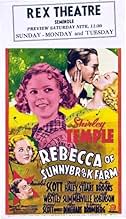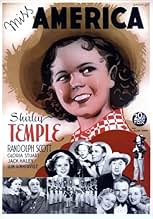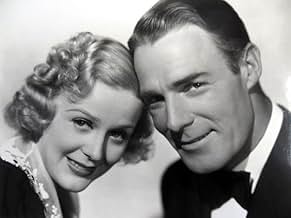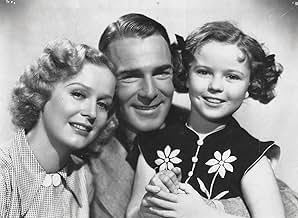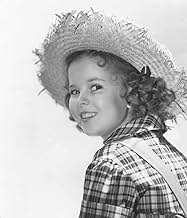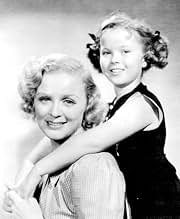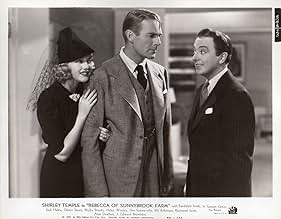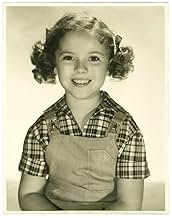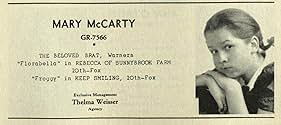VALUTAZIONE IMDb
7,0/10
2033
LA TUA VALUTAZIONE
Aggiungi una trama nella tua linguaRebecca's Uncle Harry leaves her with Aunt Miranda who forbids her to associate with show people. But neighbor Anthony Kent is a talent scout who secretly sets it up for her to become a radi... Leggi tuttoRebecca's Uncle Harry leaves her with Aunt Miranda who forbids her to associate with show people. But neighbor Anthony Kent is a talent scout who secretly sets it up for her to become a radio broadcaster.Rebecca's Uncle Harry leaves her with Aunt Miranda who forbids her to associate with show people. But neighbor Anthony Kent is a talent scout who secretly sets it up for her to become a radio broadcaster.
- Regia
- Sceneggiatura
- Star
- Premi
- 2 vittorie e 1 candidatura in totale
Raymond Scott and His Quintet
- Raymond Scott and His Quintet
- (as Raymond Scott Quintet)
Clarence Wilson
- Jake Singer
- (as Clarence Hummel Wilson)
Recensioni in evidenza
Shirley Temple definitely deserved some of her popularity after this tailor-made vehicle. The film is as adorable as the young star. It follows Rebecca (Temple) as she tries to fulfill her dream of singing on a popular radio show. She does this with the help of a few adult friends who compliment Temple perfectly. Temple herself, shines in this film. Singing, dancing and acting she shows a natural talent for performing and clearly enjoys herself with this film. All in all I would recommend this film to anyone. It might not be the best Shirley Temple film but it will keep you entertained all the way through and the enchanting lead will captivate you.
REBECCA OF SUNNYBROOK FARM (20th Century-Fox, 1938), directed by Allan Dwan, stars Shirley Temple as the title character in a screenplay suggested on but not entirely from the story written by Kate Douglas Wiggin. Returning to the formula best suited for Temple's musical talents following her performances in the more faithful adaptations to the literary works of 1937's WEE WILLIE WINKIE and HEIDI, REBECCA is actually a rehash of Temple's earlier effort, THE POOR LITTLE RICH GIRL (1936), which not only has her singing some songs composed for that production, reuniting her with co-stars Jack Haley and Gloria Stuart, with much of the setting taking place in a radio station, but another well staged military dance number finish.
The story revolves around Anthony Kent (Randolph Scott), a radio station manager, assisted by Orville Smithers (Jack Haley), on a promotional talent search auditioning hundreds of little girls for their upcoming "Little Miss America" campaign sponsored by Cyrus Bartlett (Paul Harvey), an important client for Crackling Grain Flakes. Enduring through the intercom of listening of one bad singer after another vocalizing the same song of "You Got to Eat Your Spinach, Baby" over and over again, plus having to deal with overbearing parents, Kent finally gets to hear Rebecca Winstead's (Shirley Temple) singing and is very much impressed by her. However, due to a misunderstanding by Orville, Rebecca, accompanied by her stepfather/manager Harry Kipper (William Demarest), leave the studio thinking the audition a failure. Now that he has found himself evicted from their 950 10th Avenue apartment, and flat broke, Harry, who is unable to support his stepdaughter, decides to have Rebecca live upstate with her Aunt Miranda (Helen Westley) at Sunnybrook Farm. Realizing Orville's mistake, and now at this point of a nervous breakdown, Kent decides to get away from it all by taking a rest on his farm in the country, which also happens to be at Sunnybrook. Eventually the paths of Kent and Rebecca meet, thanks to a little piggy, and discovering that Rebecca is the talented child he's been searching for, he sets out to star her on the "Crackling Grain Flakes Hour," but there's only one problem, Aunt Miranda, who detests show people, especially since her late daughter had married an actor, refuses to give Rebecca permission to perform on the radio. Gwen (Gloria Stuart), Rebecca's first cousin, also living under Miranda's roof, and in love with Kent, schemes in having Rebecca sneak out at night on a hook to book broadcast set in Kent's home. All goes well, even after Miranda hears her on the radio, until Uncle Harry, now remarried to a tough babe (Ruth Gillette), returns to Sunnybrook Farm with an attorney (Clarence Wilson) to reclaim his talented stepchild.
Amusing moments consist of Haley's love for Scott's temperamental fiancée (played by Phyllis Brooks), who performs with him but refuses to give him the satisfaction; William Demarest's frequent pratfalls on Aunt Miranda's loose board in front of her home; and Helen Westley as the strong-willed Miranda, who continues to hold a grudge on Scott's servant, Homer Busby (wonderfully played by Slim Summerville), her former fiancé, due to some misunderstanding 25 years ago. One thing about Wesley's character, every time she speaks, one expects her to lay an egg. Also in the cast are Alan Dinehart as Mr. Purvis, Kent's radio station rival; J. Edward Bromberg as Doctor Hill; and best of all, Franklin Pangborn as Hamilton Montgomery, a substitute organ player waiting for his big chance to go on the air; and Bill Robinson as Miranda's dancing farm hand.
The motion picture soundtrack includes: "Happy Ending" (sung by Phyllis Brooks); "You've Got to Eat Your Spinach, Baby" (sung by individual auditioning girls); ""An Old Straw Hat" (sung by Shirley Temple); "Crackling Grain Flakes" (sung by quartet); "Alone With You" (sung by Phyllis Brooks and Jack Haley); "Come and Get Your Happiness" (sung by Temple/by Jack Yellen and Sam Polgrass); a medley of Temple oldies: "On the Good Ship Lollipop" (by Richard Whiting and Sidney Clare); "Animal Crackers in My Soup" (by Ted Koehler, Irving Caesar and Ray Henderson); "When I'm With You," "Oh, My Goodness," and "Goodnight, My Friends (formerly "Goodnight, My Love" (all sung by Temple); and "The Parade of the Wooden Soldiers" (performed by Temple and Bill Robinson/by Sidney Mitchell, Lew Pollack and Raymond Scott).
One of the better radio musicals of the period, Temple shines as the little girl who is very self-reliant. This is also the initial film in which she loses her legendary curls, which comes after living under Aunt Miranda's roof on Sunnybrook Farm. And speaking of legendary, her tap dancing opposite Bill Robinson ranks one of their better team efforts, even if the tapping takes place on the radio for listeners to hear and not see, except for the movie viewing audience. REBECCA OF SUNNYBROOK FARM is not the sort of movie for grammar school students to base a book report on, for that this is the least faithful of the earlier screen treatments, 1917 with Mary Pickford, and 1932 with Marian Nixon. It seems interesting that the writers didn't come upon a musical version to the book from which it is based, as MGM later did with THE WIZARD OF OZ (1939), and not stray away from its original concept, but overlooking these major changes, with no harm done, it does make fine family viewing.
Distributed on video cassette and later DVD, REBECCA OF SUNNYBROOK FARM is currently available in both colorized and black and white versions. Formerly shown on American Movie Classics from 1997 to 2001, other cable broadcasts include the Fox Movie Channel and Turner Classic Movies (TCM premiere: November 22, 2012). See youz in church.(***1/2)
The story revolves around Anthony Kent (Randolph Scott), a radio station manager, assisted by Orville Smithers (Jack Haley), on a promotional talent search auditioning hundreds of little girls for their upcoming "Little Miss America" campaign sponsored by Cyrus Bartlett (Paul Harvey), an important client for Crackling Grain Flakes. Enduring through the intercom of listening of one bad singer after another vocalizing the same song of "You Got to Eat Your Spinach, Baby" over and over again, plus having to deal with overbearing parents, Kent finally gets to hear Rebecca Winstead's (Shirley Temple) singing and is very much impressed by her. However, due to a misunderstanding by Orville, Rebecca, accompanied by her stepfather/manager Harry Kipper (William Demarest), leave the studio thinking the audition a failure. Now that he has found himself evicted from their 950 10th Avenue apartment, and flat broke, Harry, who is unable to support his stepdaughter, decides to have Rebecca live upstate with her Aunt Miranda (Helen Westley) at Sunnybrook Farm. Realizing Orville's mistake, and now at this point of a nervous breakdown, Kent decides to get away from it all by taking a rest on his farm in the country, which also happens to be at Sunnybrook. Eventually the paths of Kent and Rebecca meet, thanks to a little piggy, and discovering that Rebecca is the talented child he's been searching for, he sets out to star her on the "Crackling Grain Flakes Hour," but there's only one problem, Aunt Miranda, who detests show people, especially since her late daughter had married an actor, refuses to give Rebecca permission to perform on the radio. Gwen (Gloria Stuart), Rebecca's first cousin, also living under Miranda's roof, and in love with Kent, schemes in having Rebecca sneak out at night on a hook to book broadcast set in Kent's home. All goes well, even after Miranda hears her on the radio, until Uncle Harry, now remarried to a tough babe (Ruth Gillette), returns to Sunnybrook Farm with an attorney (Clarence Wilson) to reclaim his talented stepchild.
Amusing moments consist of Haley's love for Scott's temperamental fiancée (played by Phyllis Brooks), who performs with him but refuses to give him the satisfaction; William Demarest's frequent pratfalls on Aunt Miranda's loose board in front of her home; and Helen Westley as the strong-willed Miranda, who continues to hold a grudge on Scott's servant, Homer Busby (wonderfully played by Slim Summerville), her former fiancé, due to some misunderstanding 25 years ago. One thing about Wesley's character, every time she speaks, one expects her to lay an egg. Also in the cast are Alan Dinehart as Mr. Purvis, Kent's radio station rival; J. Edward Bromberg as Doctor Hill; and best of all, Franklin Pangborn as Hamilton Montgomery, a substitute organ player waiting for his big chance to go on the air; and Bill Robinson as Miranda's dancing farm hand.
The motion picture soundtrack includes: "Happy Ending" (sung by Phyllis Brooks); "You've Got to Eat Your Spinach, Baby" (sung by individual auditioning girls); ""An Old Straw Hat" (sung by Shirley Temple); "Crackling Grain Flakes" (sung by quartet); "Alone With You" (sung by Phyllis Brooks and Jack Haley); "Come and Get Your Happiness" (sung by Temple/by Jack Yellen and Sam Polgrass); a medley of Temple oldies: "On the Good Ship Lollipop" (by Richard Whiting and Sidney Clare); "Animal Crackers in My Soup" (by Ted Koehler, Irving Caesar and Ray Henderson); "When I'm With You," "Oh, My Goodness," and "Goodnight, My Friends (formerly "Goodnight, My Love" (all sung by Temple); and "The Parade of the Wooden Soldiers" (performed by Temple and Bill Robinson/by Sidney Mitchell, Lew Pollack and Raymond Scott).
One of the better radio musicals of the period, Temple shines as the little girl who is very self-reliant. This is also the initial film in which she loses her legendary curls, which comes after living under Aunt Miranda's roof on Sunnybrook Farm. And speaking of legendary, her tap dancing opposite Bill Robinson ranks one of their better team efforts, even if the tapping takes place on the radio for listeners to hear and not see, except for the movie viewing audience. REBECCA OF SUNNYBROOK FARM is not the sort of movie for grammar school students to base a book report on, for that this is the least faithful of the earlier screen treatments, 1917 with Mary Pickford, and 1932 with Marian Nixon. It seems interesting that the writers didn't come upon a musical version to the book from which it is based, as MGM later did with THE WIZARD OF OZ (1939), and not stray away from its original concept, but overlooking these major changes, with no harm done, it does make fine family viewing.
Distributed on video cassette and later DVD, REBECCA OF SUNNYBROOK FARM is currently available in both colorized and black and white versions. Formerly shown on American Movie Classics from 1997 to 2001, other cable broadcasts include the Fox Movie Channel and Turner Classic Movies (TCM premiere: November 22, 2012). See youz in church.(***1/2)
It's almost strange to look at these "Shirley Temple films" at various stages of your own life. You view them differently as you grow older. It also depends, I suppose, on how familiar you are with 1930s films. Many of them are dated, especially with the language, songs and comedy of the period, so you have to acclimate yourself.
After a decade away from her films, I viewed this one recently and found both good and bad things about watching it. The positives, however, far outweighed the negatives and I believe this is one of Shirley's more entertaining efforts.
After starring now for about five years, it's obvious how comfortable she had become in her roles. She looked extremely confident in here and why not? She had her act down pat. She even performed one song that was medley of her hits from previous movies. Yup, she was a veteran at the ripe old age of 10 and at the peak of her career in the 1930s.
In this movie was the normal mixture of characters, meaning a crabby old woman, a nice young couple that you wanted to see get married, a couple of wacky cronies, good 'ole Bill Robinson nearby....and the regular happy ending. The wholesome and pretty woman in here was Gloria Stuart. She was the same lady who appeared in 1997's "Titantic.""
The leading man was western star Randolph Scott and the old biddy was Helen Westley. The goofballs were Slim Summerville, Jack Haley and William Demarest. This was one of the better casts in the Temple movies.
The only drawback, really, was the total lack of credibility, scene after scene of things that made no sense...such as an entire orchestra and chorus setting up inside a quiet farmhouse and the occupant (Westley) unaware of it??!!! There are a number of scenes that just leave you shaking your head in amazement. So....you just have to suspend all belief and just enjoy the comedy, Shirley's tremendous talent and appeal, and all the pleasing songs and dances in here. That done, you've spent an enjoyable 80 minutes.
Made during the Depression years when Americans desperately needed to feel good, Shirley Temple was perhaps the best at filling that need. Some 70 years later, she still ranks as the greatest child entertaining in United States history and her films still put a smile on one's face. She still makes us feel good.
After a decade away from her films, I viewed this one recently and found both good and bad things about watching it. The positives, however, far outweighed the negatives and I believe this is one of Shirley's more entertaining efforts.
After starring now for about five years, it's obvious how comfortable she had become in her roles. She looked extremely confident in here and why not? She had her act down pat. She even performed one song that was medley of her hits from previous movies. Yup, she was a veteran at the ripe old age of 10 and at the peak of her career in the 1930s.
In this movie was the normal mixture of characters, meaning a crabby old woman, a nice young couple that you wanted to see get married, a couple of wacky cronies, good 'ole Bill Robinson nearby....and the regular happy ending. The wholesome and pretty woman in here was Gloria Stuart. She was the same lady who appeared in 1997's "Titantic.""
The leading man was western star Randolph Scott and the old biddy was Helen Westley. The goofballs were Slim Summerville, Jack Haley and William Demarest. This was one of the better casts in the Temple movies.
The only drawback, really, was the total lack of credibility, scene after scene of things that made no sense...such as an entire orchestra and chorus setting up inside a quiet farmhouse and the occupant (Westley) unaware of it??!!! There are a number of scenes that just leave you shaking your head in amazement. So....you just have to suspend all belief and just enjoy the comedy, Shirley's tremendous talent and appeal, and all the pleasing songs and dances in here. That done, you've spent an enjoyable 80 minutes.
Made during the Depression years when Americans desperately needed to feel good, Shirley Temple was perhaps the best at filling that need. Some 70 years later, she still ranks as the greatest child entertaining in United States history and her films still put a smile on one's face. She still makes us feel good.
When adorable Shirley Temple gets dropped off, at her aunt's country farm, by her irresponsible uncle, she gets to know the simple life. Only life in the country isn't so simple. Her aunt, Helen Westley, has a decades-long feud with her old beau and neighbor, Slim Summerville. She refuses to speak to him, relaying messages through Shirley even when they're all in the same frame. Then there's the other neighbor, Randolph Scott, a handsome talent scout who's dating a radio singer, Phyllis Brooks. Jack Haley is in love with Phyllis, but she won't give him the time of day. And Gloria Stuart, Shirley's cousin, is trying to fight her feelings for Scottie.
In case that isn't complicated enough, Helen Westley is anti-show business, and Shirley's already auditioned for a Little Miss America radio contest! This is one of the more complicated Shirley Temple movies, which makes sense since she's growing up. She can handle more plot than Curly Top or Stand Up and Cheer. And supposedly, her audience can, too.
Shirley sings a few songs in this one, notably a medley of other songs she's performed in her older movies. While it is very cute for Shirley to sing a medley of her previous hits, it's also bittersweet. She's growing up, and she has to acknowledge that the days of her being a charming little tot are over. For her to "remind" us of her hits, it's also a reminder that those movies were a long time ago. For those who like a good story and lots of jokes sprinkled in the script, this might be your favorite Shirley Temple flick. Helen and Slim's feud is hilarious, and I always love Jack Haley. Scott and Stuart don't do much, but for no fault of their own; it's Shirley's show. Literally!
In case that isn't complicated enough, Helen Westley is anti-show business, and Shirley's already auditioned for a Little Miss America radio contest! This is one of the more complicated Shirley Temple movies, which makes sense since she's growing up. She can handle more plot than Curly Top or Stand Up and Cheer. And supposedly, her audience can, too.
Shirley sings a few songs in this one, notably a medley of other songs she's performed in her older movies. While it is very cute for Shirley to sing a medley of her previous hits, it's also bittersweet. She's growing up, and she has to acknowledge that the days of her being a charming little tot are over. For her to "remind" us of her hits, it's also a reminder that those movies were a long time ago. For those who like a good story and lots of jokes sprinkled in the script, this might be your favorite Shirley Temple flick. Helen and Slim's feud is hilarious, and I always love Jack Haley. Scott and Stuart don't do much, but for no fault of their own; it's Shirley's show. Literally!
7sol-
A pleasant if not brilliant Shirley Temple vehicle, the young actress shines as the charming Rebecca and she sings quite well too. The film itself is formulaic and very predictable with typical characters, but it nevertheless does the job reasonably well, providing an opportunity for Temple to display her talents as and actress and as a singer. The songs are a delight to listen too as well. The main setback for the film is the amateurish editing - at least three or four times continuity is broken by the presence of jump cuts - however this can easily be ignored in light of the charms of the film. It supposedly is not faithful to the source material, but as a film on its own, it does fine.
Lo sapevi?
- QuizBill Robinson visited Shirley Temple at an exclusive and restricted hotel to rehearse the "Parade of the Wooden Soldiers" number for this film. Temple later recalled, "I asked Bill what cottage he was staying in. He told me, 'I'm staying in the chauffeur quarters above the garage.' It wasn't until years later that I understood why."
- BlooperShirley Temple's stunt double, with her head turned away from the camera, is very obviously not Shirley, as she climbs down the ladder.
- Citazioni
[last lines]
Rebecca Winstead: I always told you I was very self-reliant.
- Versioni alternativeIn 2005, a new colorized version appeared, prepared by Legend Films, replacing the older colorized version used for television and video.
- ConnessioniFeatured in Biography: Shirley Temple: The Biggest Little Star (1996)
- Colonne sonoreHappy Endings
(1938) (uncredited)
Music by Lew Pollack
Lyrics by Sidney D. Mitchell
Sung by Phyllis Brooks
I più visti
Accedi per valutare e creare un elenco di titoli salvati per ottenere consigli personalizzati
- How long is Rebecca of Sunnybrook Farm?Powered by Alexa
Dettagli
- Tempo di esecuzione1 ora 21 minuti
- Colore
- Proporzioni
- 1.37 : 1
Contribuisci a questa pagina
Suggerisci una modifica o aggiungi i contenuti mancanti



